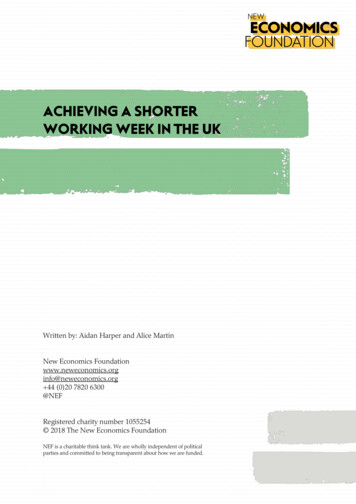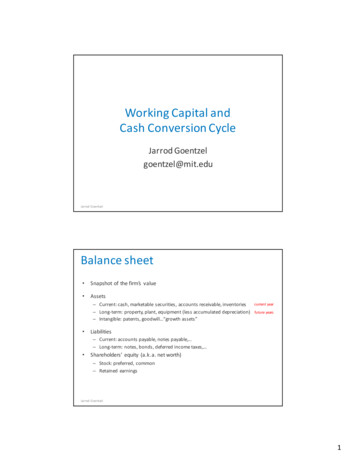
Transcription
ACHIEVING A SHORTERWORKING WEEK IN THE UKWritten by: Aidan Harper and Alice MartinNew Economics g 44 (0)20 7820 6300@NEFRegistered charity number 1055254 2018 The New Economics FoundationNEF is a charitable think tank. We are wholly independent of politicalparties and committed to being transparent about how we are funded.
2 Achieving a shorter working week in the UKCONTENTSThe case for a shorter working week . 31. Future-proof the economy . 32. Boost productivity . 43. Help support industrial transition . 44. Improve gender equality . 46. Democratic engagement . 5How to get there? . 5Unions are leading the way . 6A policy framework . 6A growing movement for change. 9Endnotes . 11
3 Achieving a shorter working week in the UKTHE CASE FOR A SHORTERWORKING WEEKWorking time is once again becoming a salient political issue. The looming threat oftechnological unemployment, low wages, stalled UK productivity growth, an ageingsociety and growing care demands are all driving the debate. The New EconomicsFoundation has long informed the shorter working week agenda, leading research thathas underpinned recent support from the Trades Union Congress1 and a spectrum ofpoliticians and media outlets.2This briefing summarises the case for shortening people’s working hours without a lossin pay and puts forward an initial policy framework for getting there. It also marks thebeginning of a new stream of work supporting those in trade unions, industry andgovernment seeking to pursue this cause in the UK and across Europe.Work can be remunerated in time, as well as money. Winning demands for shorterworking hours with incomes protected offers a way of tackling both individual andsocietal symptoms of overwork and underpay, providing people with more time torecuperate, participate in democratic process and fulfil caring responsibilities.Reducing the amount of time we all spend in work wields potential benefits for some ofthe major economic and societal challenges faced today such as an ageing population,ailing social care and pension provision. We argue that firms can benefit too throughhigher levels of per employee productivity and, though a reduction of working time isnot a silver bullet, the potential benefits are significant. Here we draw out six:1. FUTURE-PROOF THE ECONOMY30% of existing UK jobs could be impacted by automation by the early 2030s, forexample through the use of new AI technologies to replace clerical and administrativefunctions, and eventually the use of machines to replace manual tasks.3 The highestlevels of future automation are predicted in Britain’s former industrial heartlands in thenorth of England, as well as the Midlands and the industrial centres of Scotland –thereby risking a worsening of the north–south economic divide, as whole communitiesface unemployment, or (more likely) a future of insecure, low paid work.4 Rather thanallowing automation to lead to more precarity and increased regional inequality, itsbenefits could be harnessed to reduce working hours in the UK with no loss of pay, thus
4 Achieving a shorter working week in the UKhelping workers receive a greater share of the productivity benefits robots and machinelearning can bring.2. BOOST PRODUCTIVITYWhile for workers, shorter working weeks should come with the promise of no loss ofsalary, for their employers, there may also be a productivity gain. According to theOECD, countries in which people work fewer hours on average, productivity is higher.5Some firm or sectoral studies have also shown that either productivity increases ifpeople work shorter hours or, more definitively, that working long hours reducesproductivity.6 There is also growing anecdotal evidence from individual firms thatshortening the working week while maintaining pay levels boosts productivity, staffretention, and reduces time lost through sick leave.73. HELP SUPPORT INDUSTRIAL TRANSITIONThis approach could also be used as a strategy for industries in transition, whether dueto technological changes, declining high-carbon industries or changes in internationalmarkets. Reductions in working hours, accompanied by the offer of skills retraining andsignificant levels of support for local, regional and national industrial strategy, could be acentral part of an agreed ‘just transition’ deal between Government, industry and tradeunions to support workers in declining high-carbon industry.84. IMPROVE GENDER EQUALITYOn average, women currently do 60% more unpaid work than men.9 Moving towards ashorter working week as the ‘norm’ would help change attitudes about gender roles,promote more equal shares of paid and unpaid work, and help revalue jobs traditionallyassociated with women’s work. It would provide men with more time outside paidemployment to be active parents and carers; it would also change expectations as ‘parttime’ becomes the new ‘full-time’, enabling more women to take up secure and wellpaid employment.5. PUT WELLBEING FIRSTOur current model of work-time is causing harm to workers; a reduced working weekcould help cut levels of overwork and stress, and increase the wellbeing of workers.10The latest HSE statistics show that the total number of days lost to work-related stress,depression or anxiety stands at 15.4 million, an increase of nearly 3 million on last year’s
5 Achieving a shorter working week in the UKstatistics, and the third year in a row it has increased.11 One in four of all sick days lost inthe UK are as a direct result of workload.126. DEMOCRATIC ENGAGEMENTThough not the business of the state to determine what people would do with additionalfree time, one possible benefit could be a boost to people’s engagement in democraticengagement and participation, either in their workplace, neighbourhood or community.NEF has found that a lack of resources and time are a barrier to residents collectivelytaking action and influencing decisions in their local area.13 We also know that boostinglevels of economic democracy, including levels of public participation and workplacedemocracy, can contribute to a reduction in economic inequality overall.14HOW TO GET THERE?Gradually. Any move towards a shorter working week would need to be implementedgradually, alongside efforts to strengthen wage levels across the economy. For somesectors facing medium-term challenges, such as high-carbon industry in a decarbonisingUK or technological unemployment, the opportunity presented by the shorter workingweek may add a particular urgency.Collectively. For this reason, trade unions should be at the heart of this transition,negotiating and collectively winning reductions to working hours workplace byworkplace and in some instances, sector by sector. The successful implementation of acollective bargaining agenda would see all workers given the opportunity to shortentheir working time without reducing their material quality of life.Bottom-up and top-down. As we make the case for action from below, there areways in which dynamic government policy can work in conjunction with union efforts,ensuring that the principle of working-time reduction is baked in to a range of legislativetools. The mutually reinforcing use of top-down and bottom-up approaches can ensurethat gains in working time reduction are institutionalised.As part of broader reforms. To realise this vision it will be necessary to tackle a rangeof issues in tandem, including low pay, inequalities, employers’ incentives, andprevailing assumptions about what is ‘normal’ and possible. We recognise that reducingthe working week is not a silver bullet solution to work and pay issues, and cannot be
6 Achieving a shorter working week in the UKseen in isolation from broader issues – in particular from the reversal of policies thathave curbed the influence of unions, as well as bolstering the welfare state.UNIONS ARE LEADING THE WAYTrade unions are at the core of movements for working time reduction historically andtoday. Earlier this year IG Metall in Germany won the right to move to a 28-hourworking week;15 the FNV union in the Netherlands has negotiated a series of‘generational pacts’16 (where older workers shorten their hours to open up opportunitiesfor younger workers); and the CGT Union in France have begun to campaign for a 32hour week.17Here in the UK there are important cases of unionised employees pushing for aprotection of their incomes and reduction of their working hours as some of their tasksbecome mechanised: The Confederation of Shipbuilding and Engineering Unions (CSEU)’s 1989/91campaign – inspired by the successful tactics of the German IG Metall union – won a37-hour week for workers in shipbuilding and engineering roles after adopting astrategy of mass campaigning, followed by selective, indefinite strike action. More recently the Communication Workers Union (CWU) – who represent 134,000postal workers – have agreed with Royal Mail to shorten their working week in adirect response to the impact of automation.18 They argue that alongside the businessowners, their members should benefit from the mechanisation of the parcelpackaging process – in the form of shorter hours.A POLICY FRAMEWORKForecasts for automation have injected the working time debate with a new urgency.There is a risk that the returns from improved productivity are captured by the owners ofcapital to the disadvantage of workers. To date, as the IMF and others have argued,much of the gains from technology have gone to the owners of the firms and capital inthe form of a reduced wage bill and increased profits.19 A major reason for this decline inthe labour share in the face of technological change has been decades of anti-unionlegislation, and the decline in union density.20Given the scale of the task a policy framework enabling all workers to benefit from areorganisation of work and reduction of working hours is required. This might include:
7 Achieving a shorter working week in the UKPublic sector vanguards: Use the public sector as an innovator in adopting a shorterworking week without a reduction of pay, setting a benchmark for future legislation,demonstrating the impact on productivity and improving collective wellbeing. Thisfollows past policy examples where the public sector has acted as the primary adopter ofbetter working conditions (such as equal pay and job security), eventually benefitingworkers in the private sector. Potential benefits: A shorter working week in the public sector could bolster staff wellbeing, jobsatisfaction and productivity, while helping to attract a wider range of job applicants.This could begin with running controlled shorter working week trials in the publicsector as experiments designed to improve wellbeing and productivity per job.Public servants can act as positive examples for other sectors of the economy wherethese improvements can be perceived and analysed effectively. The City of Reykjavíkand the BSRB union reached an agreement to launch a trial in 2015 with over 300employees reducing their work by 4 or 5 hours a week. They report that sick dayshave reduced and employee satisfaction is up among individuals who participated inthe trial, and there has been no loss in overall productivity.21 The trial has been sucha success that they have made the change permanent and have extended it to 2,200out of the city’s 8,500 employees.Generational agreements: This proposal mimics and adapts a form of trade unionagreement used in Holland and elsewhere, whereby older workers have the right tomove towards shorter paid working hours, but don’t lose the equivalent in pay. Themore days workers give up, the less they lose in money (i.e. 80% of time for 90% of pay;60% time for 80% of pay). Potential benefits: Opening up opportunities for younger workers to enter stable and steadyprofessions.Provide older workers with alternative working arrangements and the ability to havea ‘slow retirement’ – thus avoiding the ‘cliff-edge retirement’ issues and theassociated impact on wellbeing.Creation of new bank holidays to share economic gains with workers: Thisproposal requires the creation of an independent public body to recommend new bankholidays as a function of measurable change in the economy. Since bank holidays (forthose in full time employment) are paid, the economic effects would be to increaseannual pay per hour worked in a year. It would create a ‘policy lock’, ensuring the gainsfrom increased productivity is automatically passed onto workers. Potential benefits:
8 Achieving a shorter working week in the UK Creating positive feedback loops. Paid leisure time makes labour more expensivewithout reducing overall demand, employers will likely need to either take on moreworkers or else invest in higher productivity to maintain output and profits.A gradual route to a 4-day week, which would be reached once every week in theyear had a bank holiday. Crucially, the rate of change would naturally reflect theeconomy’s ability to absorb the effects via investment and increased productivity.Rethinking and redistributing pension payments: Most of our time off work isdistributed towards the end of our lives in the form of retirement. Pension schemesshould be re-imagined to suit the individual – drawing down on that pension to takesabbaticals for times of increased caring responsibilities, to retrain and re-educate, orsimply to have time to relax and enjoy life. This could be combined with the introductionof new rights to time off work, including the contractual right to take a sabbatical or timeoff for care work.Enforcing and extending existing rights to free time: It is important to note thatchanges in working time are not always positive; liberal economic policies and exposureand the globalisation of work (primarily through the outsourcing of production) has ledto the erosion of the free time of workers under the guise of ‘increased flexibility’. Tworecent examples include the Austrian government passing a bill to raise the maximumworking week to 60 hours,22 and France’s celebrated 35-hour week coming underattack.23 An important step in the effort to reduce working time is to actively protect thelimits of working time we already have. This includes enforcing employment rights suchas a minimum wage, maximum working hours, and holiday and sick pay for all workers,including gig economy and other precarious workers. It also includes ensuring thatbusinesses can’t opt out of the European Working Time Directive and supportingimprovements to the Directive such as the inclusion of commuting time to and fromwork for certain jobs. Beyond this, the right to free time could be extended to includeimproved parental leave, a right to switch off and not be contacted digitally or otherwiseoutside or working hours, and the right for workers to take a sabbatical to take uplifelong learning or other opportunities.Embedding shorter working week as part of an agenda for transformativechange: Importantly, there are parallel changes that will need to be implemented toensure that a shorter working week is universally accessible and its benefits aremaximised – for example: Without a strong and active trade union movement to inform, shape and fight forsuch agendas, they risk misuse or dilution. Reinstating trade union power is a critical
9 Achieving a shorter working week in the UK step towards successfully implementing policies aimed at rebalancing power at workand in the economy more broadly. Repealing anti-union law is a central part of this,but a genuinely transformative policy agenda needs to go beyond this demand toinclude a new agenda for collective bargaining. This will be focus for NEF over thenext 12 months, in conjunction with unions.Bolstering the welfare state – an expansion of the welfare state, reversing damagingwelfare cuts and ensuring public services are adequately funded. The economicsecurity of a strong and universally accessible system of welfare effectively creates a‘social wage’ which could allow for the voluntary reduction of working time on thepart of individuals. This safety net would particularly benefit those on lower incomesand those who provide or receive care.24The dominant ideology of patriarchy that shapes workplaces and society morebroadly will not dissolve because everyone is working a little less. In order toincrease gender equality there will need to be strong incentives for men to use theirnew disposable time to take a greater share of childcare and other domesticresponsibilities.While a shorter working week can play a part in the inevitable transition oureconomies need to make out of carbon intensive industries, it is not anenvironmental panacea. This is primarily because the aim of most endeavours toreduce working time should be to maintain existing levels of pay, thus shifting someof the benefits of productivity growth from firms to workers. This will therefore notlead to lower levels of consumption per se, but alongside potential efficiency gains inproduction, evidence has shown that behaviour changes in types of consumptionand travel as a result of shorter working hours does reduce carbon emissions. Thisholds true even when controlling for income.25NEF will be developing this policy area over the coming months and welcomesfeedback. It comes as part of a wider policy framework we are producing in conjunctionwith unions and others to address some of the interlinked challenges shaping people’slives today such as overwork and stagnating pay.A GROWING MOVEMENT FOR CHANGENEF has long called for shorter and more flexible hours of paid work, for example in our2010 report 21 Hours and 2013 book Time on Our Side. Today NEF is an active memberof the European Network for the Fair Sharing of Working Time that includes politicalparties, sister organisations and unions such as Die Linke, European Trade UnionConfederation, European Trade Union Institute, Autonomy, and IG Metall, and holds
10 Achieving a shorter working week in the UKthe explicit aim of creating “a permanent and open forum between structured initiativesfor the sharing of working time”. NEF also supports the 4 Day Week Campaign here inthe UK.If you would like to be kept up to date on our work in this area please sign up to theNEF newsletter here or contact Aidan Harper aidan.harper@neweconomics.org. We areparticularly interested in hearing from private sector employees, trade unionists,campaigners and businesses looking to implement a shorter working week.
11 Achieving a shorter working week in the UKENDNOTES1NEF, 21 hours (2010) Available at: https://neweconomics.org/2010/02/21-hours; TUC (2018) “A Futurethat Works for Working People” fWorkReport1.pdf2BBC, Financial Times, The Guardian, New Statesman, The Spectator, and Sky News.3PwC (2017), ‘Will robots steal our jobs? The potential impact of automation on the UK andother major economies’. Available at: e Advocacy (2017), ‘The impact of AI in UK constituencies: where will automation hit hardest?’.Available at: encavel, J. (2014) ‘The Productivity of Working Hours’. IZA Discussion Paper No. 8129, Institute for theStudy of Labor; Collewet, M., and Sauermann, J., (2017) ‘Working hours and productivity’, No. 9 ResearchMemorandum, Maastricht University, Graduate School of Business and Economics (GSBE).7Roy, Eleanor (2018). ‘Work less, get more: New Zealand firm's four-day week an unmitigated success'.The Guardian. Available at: nmitigated-success.8New Economics Foundation (2018), ‘Working Together for a Just Transition’. Available at:https://neweconomics.org/uploads/files/Just transition FINAL ONLINE.pdf9ONS (2016), ‘Women shoulder the responsibility of unpaid work'. Available 0.10New Economics Foundation (2014), ‘Wellbeing at Work: A Review of the Literature’. Available a2ce151df7 8am6bqr2q.pdf11Health and Safety Executive (2018), ‘Work related stress, anxiety and depression statistics in GreatBritain 2017’. Available at: f; Health and Safety Executive(2017), ‘Health and safety at work: Summary statistics for Great Britain 2017’. Available 17.pdf.12ibid.13New Economics Foundation, Interim findings on collective control study. Forthcoming (2019)14New Economics Foundation (2018), ‘Why workers’ rights are good for the economyA new index shows how greater economic democracy leads to more prosperity’. Available -0b1c-11e8-8eb7-42f857ea9f0916Tros, Frank and Maarten Keune (2018). ‘Intergenerational bargaining in the EU Comparative report’.Amsterdam Institute for Advanced labour Studies (AIAS). Available ackbone/upload/asset/91/Final comparative report iNGenBar Tros and Keune.pdf17Liberation (2018). ‘Manifestation du 19 avril : la CGT tente la «convergence des luttes»’. Available -desluttes 1644233
12 Achieving a shorter working week in the UK18CWU (2018), ‘CWU reaches deal with Royal Mail’. Available at: /; Independent (2017), ‘Royal Mail shareholders are making 500k a day now, so why can'tworkers receive some benefits too?’. Available at: mation-a8005326.html.19IMF (2017), ‘World Economic Outlook, April 2017: Gaining Momentum?’. Pp 142-144 in particular.Available at: 7/04/04/world-economic-outlookapril-201720New Economics Foundation and University of Greenwich (2015), ‘Working for the economy theeconomic case for trade unions’. Available 74dd1368f5 51m6b4u2z.pdf21Iceland Review (2018). ‘Shorter Workweek Trial A Success’. Available r-workweek-trial-success?language en; The ReykjavíkGrapevine (2018). ‘Reykjavík’s Shortened Work Week Experiment Yields Positive Results’. Available ults/22International Law Office (2018). ‘Parliament passes new Working Time Act’. Available ct23Reuters (2018). ‘France unveils labour reforms in first step to re-shaping economy’. Available shaping-economy-idUKKCN1BA2ZU24Seekings, J. et al (2015). ‘The Welfare State, Public Services and the ‘Social Wage’’ in Policy, Politics andPoverty in South Africa, pp. 162- 184.25Devetter François-Xavier and Rousseau Sandrine. (2011). ‘Working hours and sustainabledevelopment’, Review of Social Economy, 69 (3), 333–355.
Generational agreements: This proposal mimics and adapts a form of trade union agreement used in Holland and elsewhere, whereby older workers have the right to move towards shorter paid working hours, but don't lose the equivalent in pay. The more days workers give up, the less they lose in money (i.e. 80% of time for 90% of pay;










